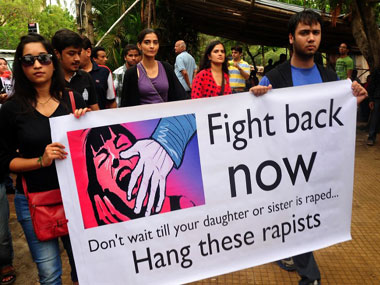The group Avaaz has released a Womanifesto, a six-point manifesto for the safety of women in the city and has asked that all the chief ministerial candidates in Delhi endorse this. The group is calling it the new plan that “could make Delhi safe for everyone.” It asks the candidates to implement the manifesto within one year if elected. Given that the Womanifesto has come out two days before the 4 December election, one wonders at the timing of its release and whether it could have come out earlier. [caption id=“attachment_1262397” align=“alignleft” width=“380”]  Representational image. AFP[/caption] Kavitha Krishnan, who’s one of the signatories to the Womanifesto and the general secretary for the All India Women’s Progressive Association (AIPWA), doesn’t think the timing is a big issue. On why it was released just before the elections, she says, “Naturally, it has been a little delayed, but we waited to see the manifesto of the political parties as they were released. Frankly we were disappointed with how they addressed the issue of women’s safety. None of them had addressed the demand women’s groups had been making. After seeing these, we’ve released our own manifesto. This is our challenge to the political parties.” For now, only Sheila Dikshit has endorsed the manifesto. However the issue of token symbolism is one that can’t be overlooked. Krishnan says, “Sheila Dikshit has endorsed the manifesto for now, but she said that she doesn’t agree to the demand of more DTC buses. This is quite disappointing and not very reassuring. We’ve been raising most of these demands to the government quite strongly for the past year but most have been rejected. This is our new challenge to them. ” Another signatory who wasn’t involved in the drafting of the Womanifesto, Dyuti a student, feels that, where the logic of the timing is concerned, “it is also about women demanding some action from any party that comes to power.” On the question of whether women’s safety occupies top priority for the political class and whether it will lead to implementation, Krishnan admits that, “Personally speaking, I feel we have to move beyond pre-poll promises and look at at real implementation after elections. Irrespective of whichever political party comes to power, we want them to implement these demands. This is a manifesto of struggle where the women’s movement is concerned.” “Given that Delhi is the national capital, we need to make women’s safety a priority for women. It’s not rocket science to draft a manifesto like this but the fact is none of the political parties have done it, hence the need for a Womanifesto,” adds Krishnan. Dyuti too feels that where current stand on women’s safety goes, the “manifestos of political parties are all populist in nature.” “It is good that issues that women’s groups wanted have a place in the form of a manifesto like this. The cynic in me says it might just be a token but then we will continue to raise our voices,” she says. Sucheta De, who was part of the Delhi gangrape student protests and a part of the All India Students Association at JNU (AISA), and has seen the Womanifesto feels it a much needed effort given that the political class made no efforts even when the protests were on. “It was the responsibility of the political classes to ensure change after the Delhi gangrape protests but it didn’t happen. The Verma Committee report was not implemented in its entirety,” she says. If one were to look at the the Womanifesto’s demands closely, it is evident that the call is not radically new. Fast track courts, a responsive police, support to survivors, better public transport are demands that women’s groups have been making for decades. For instance, the demand of fast track courts was prominently heard in the Delhi gangrape process and it figures in the Womanifesto too. But implementation hasn’t really been a strong point where this goes. According to Krishnan, “If a city can spend on games, stadiums, why can’t we spend on getting more judges, improving the court structure. Women need to be made a priority to when it comes to the government’s spending and that is what we are asking for.” Dyuti says that where implementation is concerned, “It won’t happen overnight for sure. But if an order is passed and money is set aside, one could see more fast track courts coming up.” Sucheta too says that overnight transformation of political parties is impossible. “It’s hard to expect that political parties will transform suddenly given that at times they are the worst perpetrators of violence against women themselves. But where generating response is concerned, this manifesto is important. The scale of people’s response to violence against women changed after the protests and this manifesto is part of the political expression of the people,” she says. There’s no denying that a Womanifesto releasing two days ahead of the elections seems a little late. Nor does it make any new demands. But it does put the focus back on women’s safety and the demands that were made post the Delhi gangrape case. What waits to be seen is whether the struggle for implementation of this Womanifesto will also continue in 2014.
For now, only Sheila Dikshit has endorsed the manifesto. However the issue of token symbolism is one that can’t be overlooked.
Advertisement
End of Article


)
)
)
)
)
)
)
)
)



